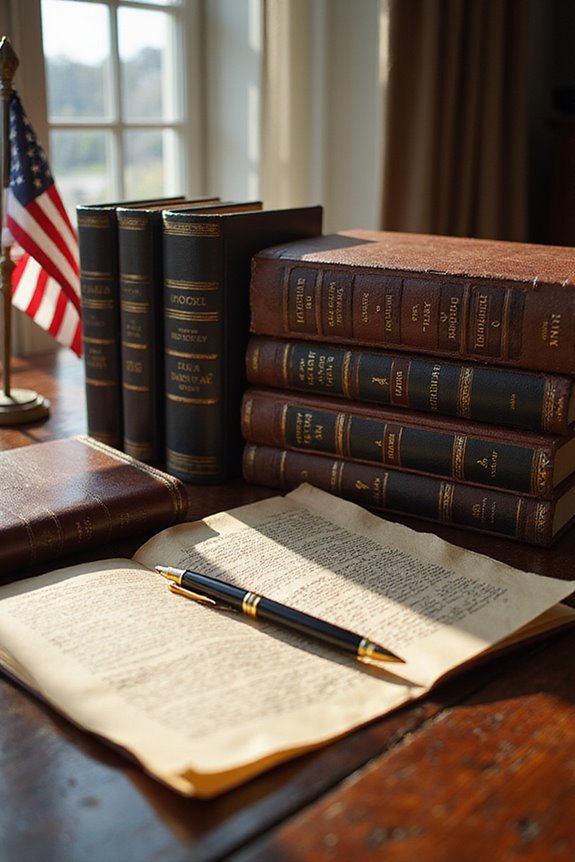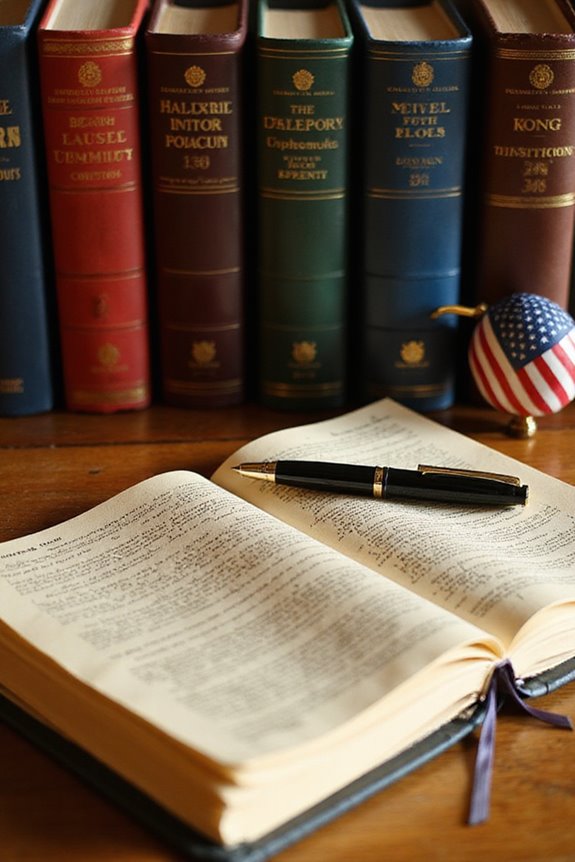Award-winning political books explore themes of power, corruption, and justice, influencing contemporary discourse. Key features include:
- Diverse narratives addressing identity politics and social justice.
- Notable winners like *Say Nothing* and *Poverty Safari* illustrate impactful political insights.
- The Orwell Prize honors literature aligned with these themes, emphasizing rigorous investigation and ethical leadership.
Engaging with these works can enhance our understanding of pressing societal issues. Interested in uncovering more about influential political literature?
Key Takeaways
- The Orwell Prize for Political Writing recognizes impactful political discourse, honoring works that align with George Orwell’s vision since 1994.
- Notable winners include *Say Nothing* (2019) and *Poverty Safari* (2018), showcasing significant contributions to political literature.
- Political memoirs provide personal insights into complex political landscapes, enhancing understanding of power dynamics and ethical leadership.
- Contemporary works explore themes of race, social justice, and economic disparity, reflecting the struggles faced by marginalized communities.
- Engaging narratives in political literature foster civic engagement and challenge readers to consider diverse perspectives and systemic issues.
Overview of Award-Winning Political Literature
Award-winning political literature offers a diverse range of perspectives on complex societal issues, helping us navigate the intricate landscape of politics.
- Major themes often include political power, corruption, and ethical leadership, as seen in classics like “All the King’s Men” and “The Prince.” Political memoirs provide personal insights into these themes, enriching our understanding of the political landscape.
- Dystopian narratives, such as “The Handmaid’s Tale,” explore state control and oppression, highlighting pressing social issues. Political literature can provide insights into the complexities of governance.
- The intersection of race, civil rights, and activism is evident in contemporary works like “The Final Revival of Opal & Nev.”
- Political satire and activist literature frequently challenge systemic injustices while promoting dialogue.
- Poetry, exemplified by Danez Smith’s “Don’t Call Us Dead,” serves as an essential form of political expression, reflecting diverse identities and resistance.
These texts inspire critical thinking and informed discussions on political matters.
Notable Winners of The Orwell Prize for Political Writing

The Orwell Prize for Political Writing recognizes exceptional literary contributions that align with George Orwell’s vision of impactful political discourse. Established in 1994 by Sir Bernard Crick, it honors works that exemplify the Orwell legacy. Notable winners include Victoria Amelina, awarded posthumously in 2025 for *Looking at Women, Looking at War*, which addresses Ukraine’s contemporary struggles. Other significant nonfiction winners are *Say Nothing* (2019) and *Poverty Safari* (2018). The Prize’s significance lies in its independent judging panel and diverse categories, including political fiction and journalism. By expanding to include themes like social evils and youth engagement, the Prize continues to foster a deeper understanding of political literature, encouraging critical discourse in today’s complex political landscape. This commitment to recognizing diverse voices is evident in the recent 2025 winners announcement, which highlights important contributions to political writing and fiction. The Prize often emphasizes historical context to connect political ideas with their environments, reflecting the evolving nature of political thought.
Themes in Contemporary Political Nonfiction

Contemporary political nonfiction serves as a vital lens through which we can analyze pressing societal issues. It addresses themes like identity politics, highlighting how race, gender, and class influence political power dynamics. Economic disparity is another significant topic, exploring how wealth concentration affects democracy and fosters political marginalization. Moreover, these works emphasize social justice, revealing systemic power imbalances and ethical dilemmas faced by marginalized communities. Activism themes permeate these narratives, showcasing grassroots movements that advocate for change. By examining the interplay of these elements, we gain insights into the consequences of entrenched power systems and the urgent need for reform. This genre not only informs but also inspires action toward a more equitable society, reflecting the lasting impacts of political fiction on our understanding of contemporary issues. Additionally, prominent titles like “The Political Economy of Distributism” highlight property ownership as a crucial factor in social justice discussions, emphasizing the role of economic theories in shaping societal structures.
Influence of Historical Context on Political Books

Understanding how historical context shapes political books is essential for grasping their impact and relevance.
- Major wars, like World War II, profoundly influence narratives, as seen in “Roosevelt: The Soldier of Freedom,” which examines FDR’s leadership. This Pulitzer Prize-winning work underscores the significance of political skills during times of global conflict.
- The English Civil War framed Hobbes’s Leviathan, illustrating how instability affects political philosophy and concepts of sovereignty, and highlighting the influence of geopolitical factors on governance.
- Racial violence plays a critical role in narratives like “Wilmington’s Lie,” which revises historical accounts regarding power dynamics.
- Political corruption and crises, exemplified in All the King’s Men, reveal the consequences of ambition in governance.
- Ultimately, historical events compel authors to challenge traditional political ideals, prompting reflections on ethics and the legitimacy of power.
This intertwining of historical context and political philosophy enriches our understanding of political literature.
Gender and Oppression in Award-Winning Narratives

When exploring gender and oppression in award-winning narratives, we find that these texts often challenge traditional power dynamics.
- Many authors frame male supremacy as a political choice, questioning the permanence of gender relations.
- Historical examples of non-patriarchal societies demonstrate alternative gender systems are possible.
- Award-winning narratives frequently highlight female agency, showcasing women’s responses to systemic failures, including female-led violence.
- These stories illustrate how women reclaim power when justice systems fail to protect them.
- Intersectional analyses reveal how gender, class, and state relations shape women’s experiences of oppression.
- By addressing these themes, these narratives contribute to broader discussions on female agency and the normalization of gendered oppression in society. Additionally, the emphasis on accountability and transparency in political discourse reflects the need for systemic changes that support marginalized voices.
Power and Corruption: Central Motifs in Political Literature
Political literature often serves as a mirror reflecting societal issues, particularly the pervasive themes of power and corruption.
- Shakespeare’s “Richard II” illustrates how political betrayal leads to a monarch’s downfall, highlighting the fragility of authority.
- In “Measure for Measure,” we see ethical dilemmas emerge through Angelo’s abuse of power, exposing moral corruption in governance. Ethical governance is crucial for societal well-being, as demonstrated by the consequences of Angelo’s decisions.
- The Duchess of Malfi presents a corrupt political environment, where betrayal and manipulation result in chaos and destruction.
- Modern political literature critiques systemic corruption, emphasizing the dangers of concentrated power and the consequences of prioritizing personal gain over public welfare.
- These narratives reveal how unchecked ambition and moral ambiguity can lead to societal instability and the tragic outcomes of ethical failures in leadership.
Narrative Techniques in Political Storytelling
In crafting compelling political narratives, we often employ various techniques to engage audiences and convey complex ideas effectively.
- Character Archetypes: We frame characters as heroes, victims, or villains, which enhances emotional persuasion and fosters audience connection.
- Narrative Arcs: Classic structures like the “winner’s tale” or “loser’s tale” guide voters’ understanding of policy outcomes.
- Policy Framing: Simplifying intricate political issues into relatable stories aids in voter comprehension and recall.
- Storytelling Techniques: Clear protagonists and antagonists facilitate emotional investment and audience alignment.
- Voter Engagement: Effective narratives mobilize supporters by creating frameworks that justify policy agendas and build trust. Narratives shape attitudes and behaviors, emphasizing the importance of balanced narratives to promote constructive dialogue and policy progress without divisiveness.
Recommendations for Essential Political Reads
As we explore impactful political literature, it’s important to recognize the books that have shaped contemporary discussions and analyses. Here are some essential reads that inspire political activism and promote civic engagement:
- *Our Enemies Will Vanish* by Yaroslav Trofimov offers insight into Ukraine’s resilience amidst conflict.
- *Against Elections* by David Van Reybrouck critiques traditional democratic processes, suggesting alternatives for improved civic involvement.
- *Open Democracy* by Hélène Landemore presents fresh ideas for expanding democratic participation in today’s society.
- Classics like 1984 and *The Handmaid’s Tale* remain crucial for understanding authoritarianism and societal issues.
These works challenge our perspectives and encourage active participation in our democratic systems. Engaging with these texts fosters informed discussion and action in political spheres, highlighting the importance of political writing in contemporary discourse.
Frequently Asked Questions
How Are Award-Winning Political Books Selected and Judged?
When it comes to selecting and judging books, we rely on clear selection criteria established by expert judging panels. They assess originality, clarity, and relevance, ensuring only the most impactful works receive recognition and awards.
What Impact Do These Books Have on Public Opinion?
Like a pebble causing ripples in a pond, these books shape public discourse and spark societal change. They enlighten us, challenge our assumptions, and ultimately influence how we perceive and engage with the world around us.
Are There Specific Genres Dominating Contemporary Political Literature?
We’ve noticed political memoirs and social justice narratives dominating contemporary literature, reflecting urgent societal issues. These genres resonate deeply, shaping public perception and inspiring readers to engage with critical political discourse and personal stories of resilience.
How Do Authors Research for Political Nonfiction Writing?
When researching for political nonfiction, we utilize interview techniques to gather insights and emphasize source evaluation to guarantee reliability. This approach helps us construct well-informed narratives that resonate with readers and reflect accurate political landscapes.
What Role Do Awards Play in an Author’s Career?
Imagine a spotlight shining brightly upon an author; awards illuminate their path, paving the way for career advancement and literary recognition. We see how accolades transform dreams into reality, opening doors to new opportunities and audiences.






